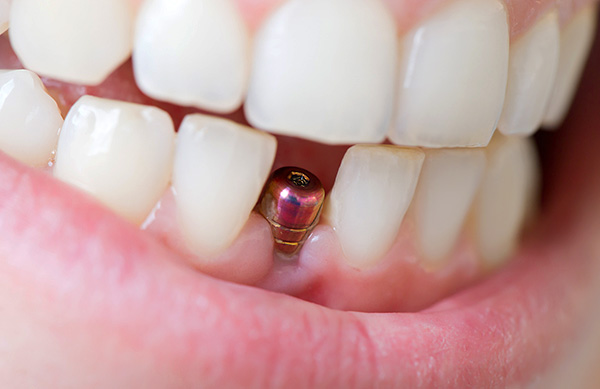
Next you will find out:
- How much a tooth implant usually serves and whether it really can stand safely until the end of life, as is sometimes said in the advertisements of dental clinics;
- What is the difference between the guaranteed service life of dental implants, declared by the manufacturer, and the guarantee for implants given by the clinic?
- What is the average real life of dental implants in different price categories;
- How to know that it is time to change the implant, and what factors may contribute to the occurrence of problems;
- And do dentures installed on implants serve as long, and why do they sometimes have to be changed a couple of years after installation?
- As well as a few simple practical tips that will extend the life of dental implants ...
Dental implantation is a rather expensive procedure, and therefore the patients' desire to receive a lifetime or at least a multi-year warranty on the installed implants is fully justified.At the same time, advertising slogans of many dental clinics, it would seem, paint quite bright prospects and do not give reason to worry: “the life of our implants is 30 years”, “our dental implants will serve you until the end of life!” And others in the same spirit.
But can implantologists really guarantee such a long service life of dental implants, and could it not be that the installed expensive structure will have to be changed after a couple of years?
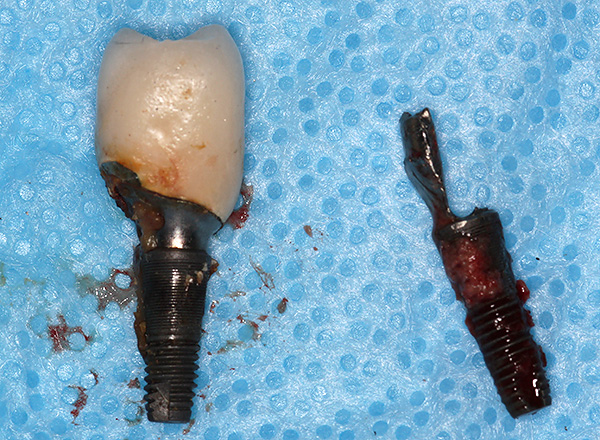
In order to better understand how much a tooth implant actually serves, let's first see what the guarantee for dental implants given by the clinics differs from the service life set by the manufacturer. And then we will also talk about whether it is realistic to achieve life-long results from the use of artificial teeth.
What makes the implant warranty different from their service life?
So, there are two important concepts that are closely related to the service life of dental implants:
- Product warranty (service life), which is established by the implant manufacturer;
- As well as the warranty period for the work performed on the treatment established by the clinic.
Warranty and durability from the manufacturer
Many companies, especially the most serious ones that have been on the market for more than a decade, offer a lifetime warranty on the dental implants being manufactured. These include mainly manufacturers of expensive premium products: Nobel, Alpha BIO, AstraTech, XIVE Friadent, Straumann and some others.
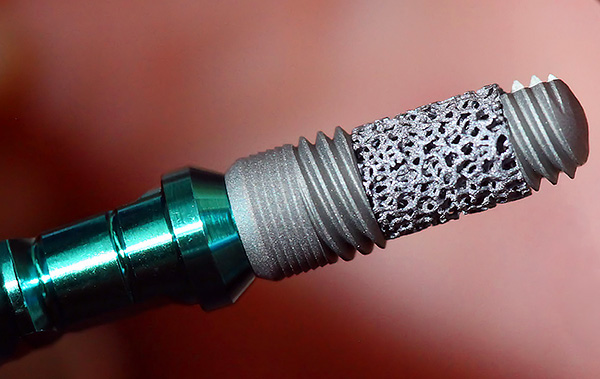
Firms that produce less branded products (of the average price segment) give a guarantee for their products in 20-25 years. Actually, this is the guaranteed service life of dental implants of the middle price category, however, provided that they are installed and then operated, as they say, in compliance with all rules and regulations.
On a note:
Teeth on implants can be compared with an expensive car. For example, you can drive more than 500 thousand kilometers in the German Mercedes. But provided that the owner will carry out regular maintenance of the car, change the oil, candles and other parts. The same with new teeth - in theory, implants will last for several decades. But in practice, much depends on how professionally the doctor has worked, and also how the patient himself will exploit new teeth. An important role is played by daily care, regular removal of dental deposits (yes, plaque accumulates on artificial teeth),as well as undergoing preventive examinations at the dentist.
Under all conditions, even implants of the middle price category can reliably hold in the jaw and regularly serve much longer than the declared 25 years, and it is possible that they never need to be changed.
Dental clinic implant warranty
The second type of guarantee is provided directly by the dental clinic (or even by a doctor, if it works individually). And usually the duration of such a guarantee is only 1-2 years. Generally speaking, the legislation of the Russian Federation does not regulate the terms of warranty obligations for dental services, therefore each clinic establishes them independently.
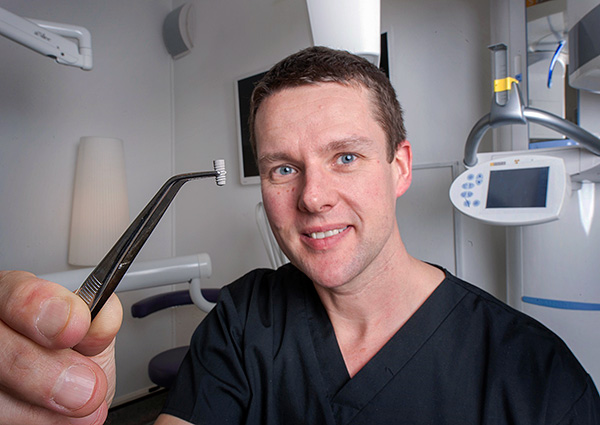
There is quite a reasonable question: why do manufacturers give almost an eternal guarantee for implants, and doctors - no more than a couple of years?
Well, this is explained quite simply: the doctor (or clinic) can give a guarantee only for the work done. In practice, it is during the first 1-2 years that the risk is relatively high. implant rejection for reasons beyond the control of the patient, namely the fault of the implantologist.
But if the implant has to be removed and changed after 3-5-10 years, then the problem usually lies in the lack of proper care for artificial teeth or deterioration of the patient’s general health. It is quite obvious that the doctor’s fault is absent here, and consequently, there is no reason for him to extend the guarantee for such a long period of time. That is, to guarantee the eternal service of implants to a person who does not brush his teeth or nibbles nuts every day - more expensive.
In general, it can be said that when it comes to the implantation guarantee, the patient of the dental clinic is not always in an advantageous position. According to statistics, most of the problems with implants are still the fault of the doctor - due to inexperience, inattention, with an incorrectly chosen construction or an incorrectly performed surgical operation to install the implant. However, in practice it is not always possible to prove that the cause of the problems lies precisely in the error of the specialist and that during the warranty period he is obliged (and this should be spelled out in the contract) to replace the implant.
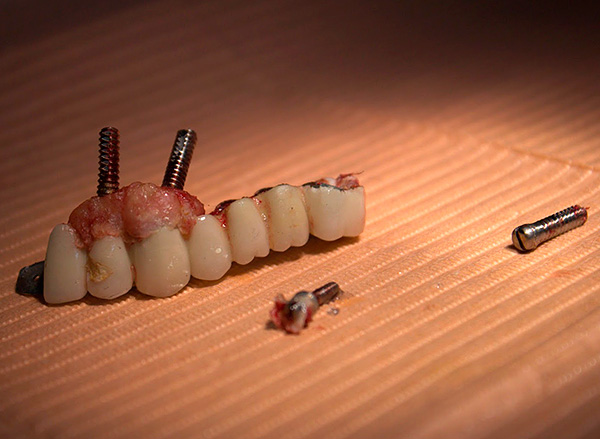
As a result, many patients faced with complications after implantationlooking for support from specialists of other clinics. For example, the implant became painful, moving, or completely dropped out of the bone - clinics often do not regard such situations as warranty cases, blaming the patient. However, some doctors honestly admit their mistakes and successfully eliminate them - changing an unattached implant or offering the patient a different kind of prosthetics without re-paying the treatment.
Feedback:
“Installed a German expensive implant on the six. The operation went well, almost without discomfort. She immediately asked how long she served and how long this dental implant lasts. The doctor said that the age of 15-20 will surely stand. But in fact it turned out to be completely different ... After a month, there was severe pain, swelling and redness. I came to the clinic, they said that it was a long time! They say that the rejection has begun and the reason for not establishing, most likely, is improper hygiene. The implant was removed and refused outright to refuse to re-do anything. Then she turned to another clinic - they said that the reason was that the implant was too long and stood crooked. Here you have expensive implants, and the hands of a doctor are not growing from there! .. ”
Irina, Moscow
So the service life of even the most expensive dental implants in problem situations can be calculated in just a few months. Moreover, numerous reviews on the Internet suggest that such cases are not such a rarity. And the patient, unfortunately, has to undergo re-treatment in a different clinic and re-spend a lot of money.
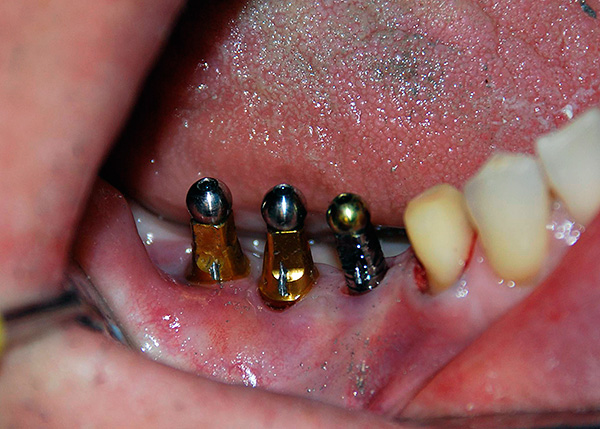
Here are some practical tips to help reduce the risk of a clinic waiver:
- choose a clinic that has been on the market for a long time, values its “name” and tries to preserve a positive reputation;
- in dentistry, everything should be provided for implantation: diagnostic equipment, the presence of surgeon-implantologists, as well as orthopedic surgeons, who will be able to manufacture prostheses with fastening on implants;
- choose an experienced doctor who has performed more than one successful implant installation operation;
- study the reviews not only and not so much about the clinic as about the doctor - both on the Internet and in the book of complaints and suggestions (you can check its availability with the administrator of the clinic);
- visit a few free consultations - compare the opinions of specialists regarding your situation;
- strictly observe all prescriptions of the doctor and do not skip routine inspections;
- Do not pursue cheapness - implantation, by definition, cannot be too cheap, and expensive implants constitute a significant part of the price.
Speaking about the service life of implants, it is worth recalling that the titanium "screw" screwed into the jaw bone is only part of the whole structure, which also includes the abutment and the prosthesis itself (for example, a crown). What is what - clearly shown in the photo below:
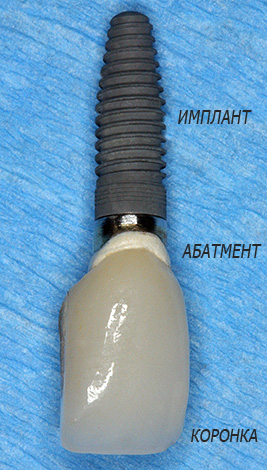
So, it is useful to keep in mind that the service life of prostheses can be many times less than the service life of the titanium implants themselves. We'll talk more about this later.
So how much does a tooth implant actually serve?
In our country, dental implants appeared no more than 20 years ago, and the stage of active development is even less. Therefore, a rare dentist can boast at least 10 years of experience in the installation of dental implants. So, it is quite problematic to find out exactly how much implants have to be changed in case of successful engraftment and normal operation. Such statistics are simply not collected yet.
However, overseas implantation has a longer history. For example, in European countries, the first operations began to be carried out back in the 60s of the last century, which makes it possible to trace the statistics over a sufficiently long period of time.
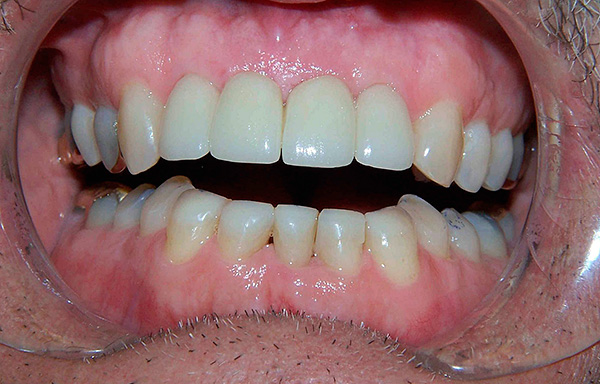
It is interesting!
According to foreign practice, the highest service life is observed in premium segment implants - Astra Tech, Nobel, Straumann, XIVE, Ankylos, Bicon. On average, they have been holding for at least 20 years without any problems. For about 10–15 years, middle-class implants have been used - for example, such brands as Implantium, BioHorizons, MIS.
But this is only averaged statistics. As inexpensive implants can last until the end of life, and the most advanced systems can become a problem within a couple of years after installation (or even earlier). Each case is individual, and the real “shelf life” of implants depends both on the patient’s state of health and his responsible attitude to new teeth, and on the professionalism of the implantologist who performed the prosthetics.
Above, it was primarily about dental implants of the classical type. The lifespan of today's popular basal implants (that is, those installed not in the loose surface part of the bone, but in its more dense basal layers) is generally comparable with the classical ones.Today, those models of basal implants that were installed through a lateral incision in the gum have practically become a thing of the past - they were often rejected within 2-3 years without sustaining the load from the prosthesis (for example, see the photo below).
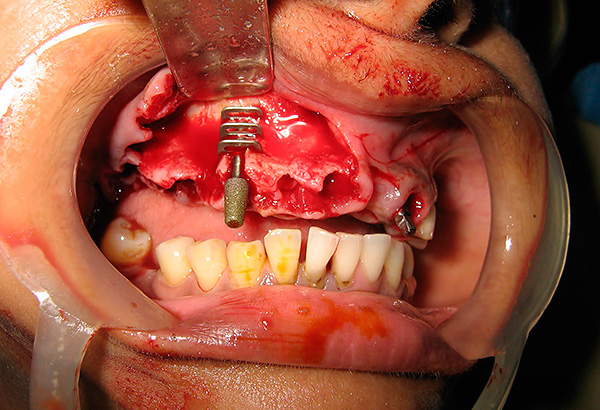
And although in Russia, basal implantation began to be practiced not so long ago, today there is every reason to believe that, provided that the oral cavity is sufficiently hygienic, modern designs can last a person for decades.
Even implants installed in a weakened bone, for example, with periodontitis or periodontal disease, can safely serve for many years (with daily thorough oral hygiene and, possibly, annual drug therapy).
As for the service life of the so-called mini-implants, then, according to the manufacturers, it is similar to the service life of classic implants and is on average 20-25 years old. However, to trace this in practice is not yet possible, since mini-implants are installed no more than 10 years. And the reviews about them vary: some experts believe that this is a great (and inexpensive) opportunity to fix inconvenient dentures, although some doctors do not recognize these systems.
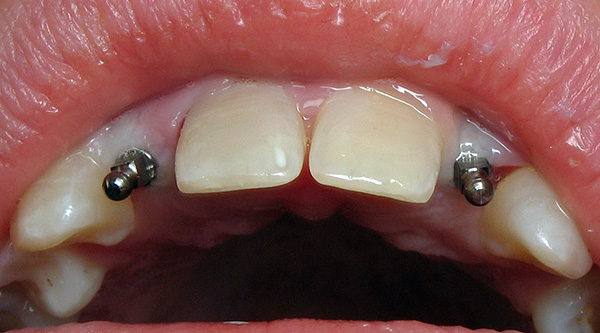
On a note
Mini-implants are not placed in the bone, but in the periosteum (the tissue between the bone and the gumline), because of which the bone tissue, not receiving sufficient chewing load, atrophies and sags. As a result, you have to constantly adjust the prosthesis. And the position of mini-implants from excessive load sometimes changes, which can lead to their mobility, rejection and the need to remove even a couple of years after installation.
How to know that it's time to change the implant
To understand that it is time to change the implant of a tooth, only a doctor can determine. It is only important to regularly visit your attending dentist (1-2 times a year) to assess the course of engraftment of the implant and inspect the condition of the tissues around it.
Generally speaking, the need to change implants usually occurs only when there are any serious problems and their corresponding symptoms. Moreover, such problems can arise both a year after installation of the product, and 10, 20 and even 30 years of its active operation.
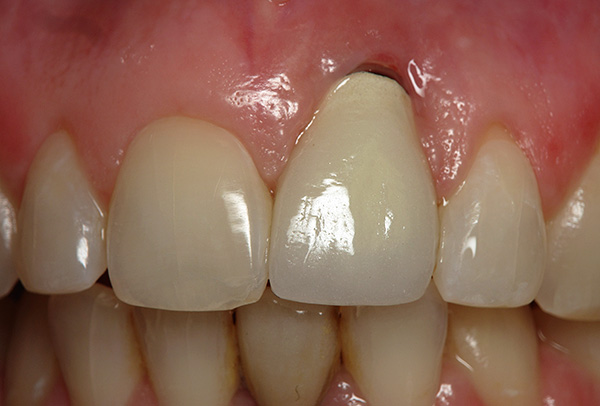
If you do not feel any pain or discomfort or other problems associated with the previously installed implant, then you do not need to change it.
Here are the typical reasons for replacing implants, which are most often encountered in practice:
- jaw or tooth injury in which the implant mobility appeared.The design can also be pushed deeper into the jaw bone, or, conversely, unscrew;
- periimplantitis (inflammation of the tissues around the implant): usually accompanied by redness of the gums, soreness under pressure, pus can be released and an unpleasant smell from the implant can appear;
- implant rejection - occurs as a consequence of periimplantitis. A characteristic sign of the problem is also the mobility of the implant.
Thus, with the appearance of mobility (even insignificant, which sometimes can only be assessed by a doctor with the help of special devices), the appearance of edema and tissue redness, pain in the area of the installed dental implants - it is likely that the life of the structure is coming to an end.
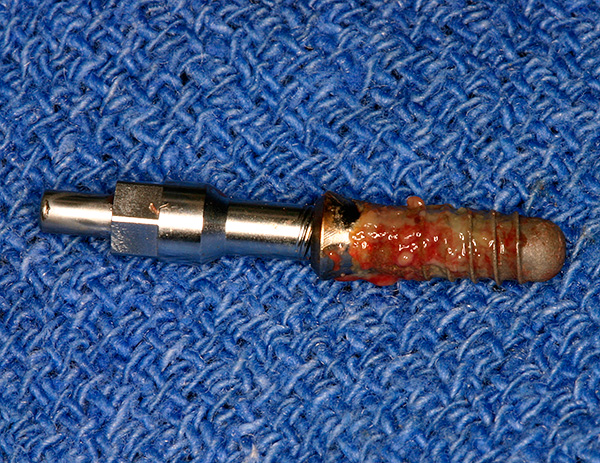
How much longer will it last and how long should a movable tooth implant be removed? If the doctor says that it is time to change the implant (and this is usually the case with the detection of mobility), then it should be done as soon as possible. Otherwise, tissue inflammation can lead to serious complications, even those that may threaten the patient’s life.
As a result, surgery is performed to remove the movable structure: the prosthesis is removed,the gum is cut and the implant is removed from the jaw. As a rule, then, after about 1-2 months, re-implantation is possible. In some cases (depending on the reason for removing the implant), the patient may be offered a different method of prosthetics.
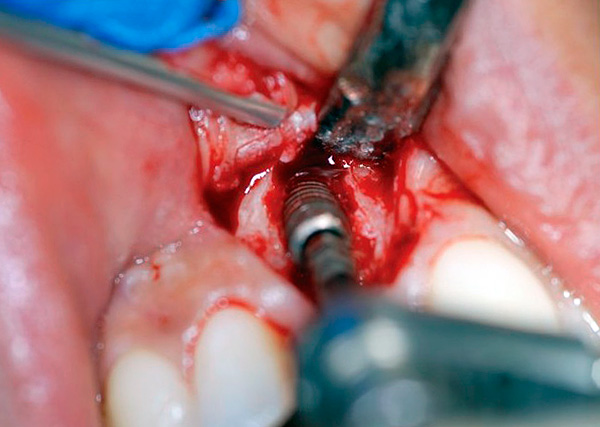
On a note
It should be borne in mind that in the case of prosthetics on implants, problems can arise not only with a “titanium screw” implanted in the jaw, but also with the outer part of the structure - the prosthesis itself, whose durability is often lower than that of a metal implant. About how many such dentures on implants change, we will talk further on ...
Will the prosthesis last as long as the implant?
So, a metal implant, implanted in the jaw bone, may eventually become mobile (rejected) due to inflammation of the tissues around it. Now let's see how things are going with the use of the outer part of the structure - with the prosthesis, and how soon it may need to be replaced.
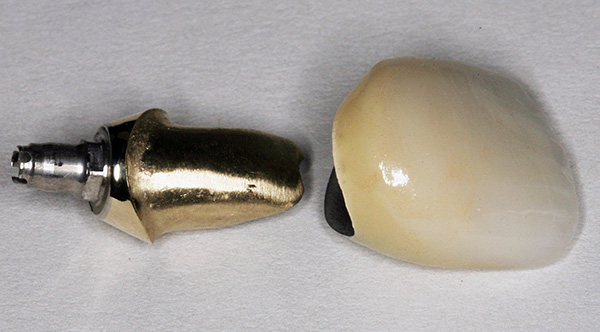
First of all, you need to keep in mind that the life of the prosthesis on implants largely depends on the material from which the crowns are made.Prostheses made of metal lined with plastic (metal-plastic crowns) are considered to be the most short-lived - plastic is relatively poorly attached to the base and often cracks and splits off under load.
In addition, plastic is a porous material, and absorbs food coloring, as well as the smallest leftover food; as a result, the color of the crown changes, it becomes a breeding ground for bacteria. The service life of such prostheses made of metal - no more than 2-3 years.
Crowns made of metal ceramics are much stronger and more durable. They average serve about 10-12 years. Among the main problems of these prostheses are chipped ceramic enamel and the formation of cracks on the outer coating (however, in order for such defects to form, the load must be very significant, much greater than in the case of metal-plastic crowns).
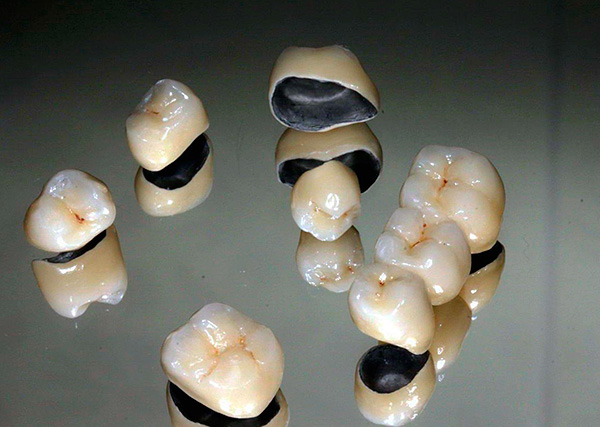
In addition, both in the case of metal-plastic and metal-ceramic prostheses, patients often have allergic reactions to the metal (usually for inexpensive alloys, so the problem can be partially solved by choosing precious metals, although this is a very expensive option).
Prostheses made of zirconium dioxide are considered the most perfect and durable - this is a very strong, aesthetic and non-allergenic material. In this case, the service life is quite simple: how many years titanium implants stand, almost as many zirconia prostheses will stay there (the service life claimed to be at least 15 years).
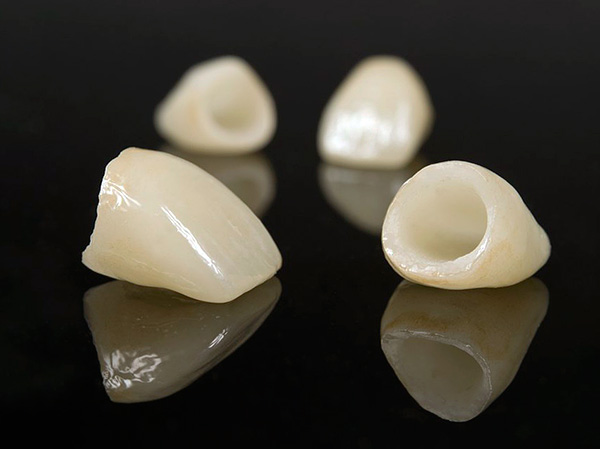
On a note
If any prosthesis breaks down, it is not necessary to remove the implant. The crowns are removed (in some cases, together with the abutment, especially if it is not a template, but an individual one), then the impressions are taken anew and a new prosthesis is created.
What ultimately determines the service life of a tooth implant
In view of the foregoing, the following summary can be made: a modern dental implant in many cases can reliably last until the end of life, and at least not less than the service life claimed by the manufacturer. However, whether everything will turn out well depends on a number of conditions, the key of which are:
- the professionalism of the implantologist and the correct installation of the implant;
- the professionalism of the orthopedic surgeon who takes part in the manufacture of the prosthesis (the correct load on the implants from the side of the prosthesis, its exact fit to the gums and implants is very important);
- high quality of the implant (today, by the way, there are Chinese dental implants, the quality of which is not always predictable);
- adequate oral hygiene and care for prostheses on implants from the patient;
- general health of the patient.
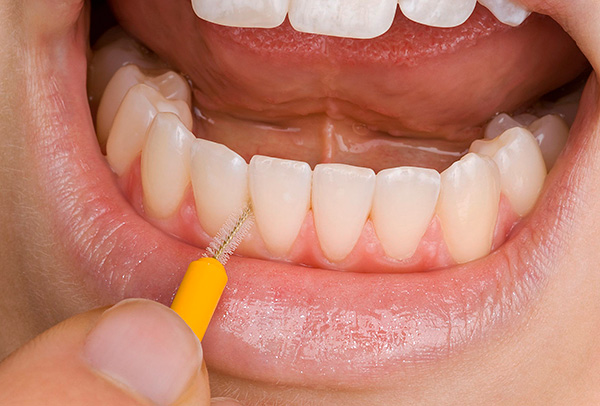
Implantologists note that many patients, after the implants are fully engrafted and permanent dentures are installed, unfortunately, forget about hygiene and regular preventive examinations, believing that artificial teeth, unlike natural teeth, are not attacked by bacteria - they are artificial, and therefore "Inedible" for bacteria.
Yes, caries are not formed on metal, plastic and ceramic crowns, but undesirable dental deposits may well form. In addition, artificial teeth are surrounded by living tissues, inflammation and damage to which, including due to non-removable dental deposits in time, can lead to a reduction in the life of the implant and the need to remove it with the crown.
So, as you can see, how long the implants of the teeth will stand in depends on the patient himself.
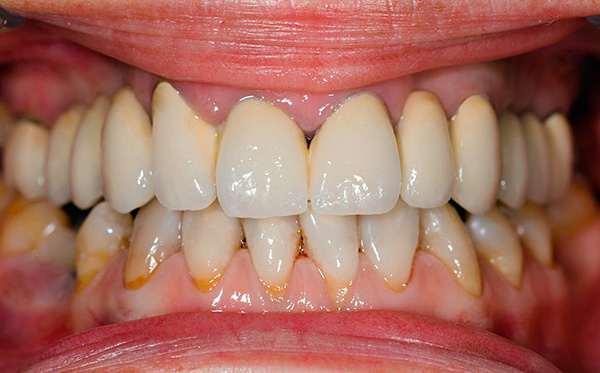
On a note:
Implantation is a rather expensive procedure, and not every patient can afford to update the installed implants every 5 years. Therefore, money in this situation is a good motivator for respecting your teeth. For example, many patients after implantation generally quit smoking, because this habit is generally increasing the risk of implant rejection.
Useful tips on how to extend the life of dental implants
So, the implants are installed. We will assume that all contraindications to treatment were excluded, and artificial teeth found their place in the jaw as if they were relatives. Then it is only the patient himself.
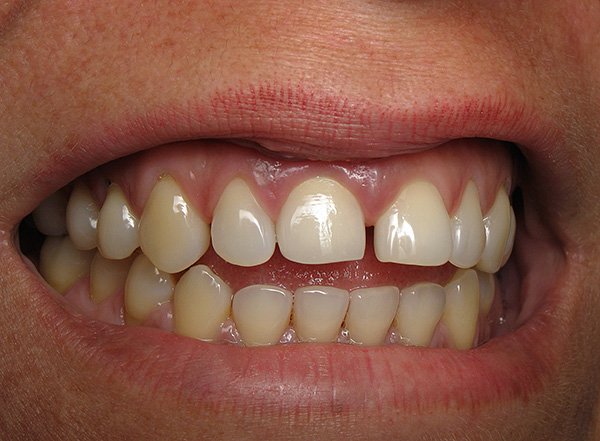
Here are some useful tips, adhering to which, you can significantly increase the chances that a tooth implant will have a maximum service life - until the end of a person's life or at least 10-20 years:
- regular enhanced oral hygiene. In the morning and in the evening - brushing and paste, it is also desirable to use irrigators or special interdental (interdental) brushes-brushes. After eating - the removal of food residue, and usually do not recommend the use of dental floss, as it can cause damage to the mucous membrane and prosthesis.Better use irrigator. Special attention - to the gums, it is impossible to prevent their inflammation;
- Refusal to smoke - it adversely affects the state of the mucous membranes of the oral cavity, which, in turn, is fraught with the risk of disruption of metabolic processes in the tissues around the implant and its rejection;
- Limiting the load on the implant and prosthesis (do not chew nuts, do not open the bottle with your teeth);
- 1-2 times a year, it is necessary to remove dental deposits - plaque and stones, since they can provoke inflammation of the gums;
- Needless to say that the face and jaw must be protected in every possible way from injury;
- At least once a year - preventive examinations at the dentist to assess the condition of the dental system. Such examinations sometimes allow to identify an emerging problem in time and not to bring it to the extreme.
If you have personal experience with prosthetics on implants, be sure to leave your review at the bottom of this page, telling you if everything is great in this regard, or if you have any problems.
An interesting video about removable and fixed prostheses and what is better - implantation or crowns?
Why the dental clinic does not have to guarantee the results of dental implants

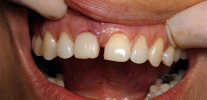


The most important thing in our life is expensive is the treatment of dentists ... And they are not responsible for anything else? Why I began to watch your articles today, because today I have been given crowns on implants ... It would seemeverything is good and I picked up the doctors with experience ... But when removing the impression for the crowns, he twisted the plug, then the smell started, and I told him, but he explained that it was from tweezers. And today again the same smell when installing the implant. I read now, on your website it says that this is not normal. Again he told him, but he did not explain and put it. And how to be in this case?
Good day! Regarding the fact that doctors are not responsible for anything - it is you in vain! When you contact the clinic, you enter into an agreement, under which the responsibility of the parties, including warranty obligations, is stipulated.
I do not know what kind of smell it went initially, but I can assume that if he alerted you, the smell was not “medical”. The doctor's answer "... from tweezers" is surprising - was the tweezers not sterile? Sterile instrument does not smell suspiciously.
If the smell was still “medical” in nature, then everything is in order - sometimes medical solutions may seem unpleasant to the patient. People are all different.
Regarding what to do - I recommend to go to another doctor for advice,or ask your doctor to strongly explain the nature of the smell, take a picture and make sure that everything is in order for your own peace of mind.
Hello! Thank you for your reply. Talk to the doctor again ...
It took 1.5 years, and I had a crown. An implant was placed for 30 thousand rubles. The doctor did not tell me anything about the timing, what a crown is worth, etc. The document that the doctor did and put, too, did not give. He is now out of this clinic. I opened my own. I turned to him. He said that almost 2 years have passed, but he is doing something now. I have to pay for the work again.
Antonina, hello. Warranty obligations are determined by the clinic, basically it is a year or more. The clinic where the implant installation work was carried out is legally responsible for the work performed. As part of the warranty, the clinic provides a doctor (former or other - at the request of the patient), who redoes the work. In your case, not only are there no documents confirming the treatment, but, in addition, you have addressed for the elimination of the problem not in the same clinic, but in another one. Most likely, you will have to pay for treatment again.
Regarding the reason for the decomposition, which caused the loss of the crown - without presenting the whole clinical picture, it is rather difficult to suggest. This may be an understatement of the height, temporary setting with insufficient force when unscrewing the screw, etc.
Hello. My implants are very good for 4 years, but the crowns and heads constantly required screwing. The last time when they decided to replace the heads, they saw splits of pieces on 2 adjacent implants (Israeli). Now, after 2 months, the gum began to burst and pus is formed, since there is no tightness in the implant-head joint. I think that the reason for loosening the heads was just because of the breakaway pieces of implants in the upper part. Is it possible to leave well-established implants, say, by twisting the heads and using a filling material for sealing? Now twisted head with an increased torque of 40 NM. How will the head-implant connection with a filling material behave?
Alexander, hello. In your case, it is possible that the internal hexagon of the implants is flared during installation.This can happen in the case of a very dense bone, where the doctor needs to more carefully create a cavity in the bone for the future implant, so as not to exceed the efforts during its installation (screwing).
The proposed option for cementing screws and abutments is unacceptable, because the release of cement beyond the boundaries of the implant will only aggravate the situation - will lead to reimplantitis and bone loss. In this case, replacement of implants is necessary, in compliance with the surgical protocol and subsequent prosthetics.
After three years, as the implant and prosthesis were installed, the prosthesis began to fly off the implant. I come to the clinic, I get a prosthesis (crown) on the cementing compound of Fuji. A month later, the prosthesis again “flies”. They again put on Fuji, in a month the prosthesis “flies”. Now every week (already 4 times) I go to the clinic and they put the crown on Fuji again. Tell me what to do? Make a new prosthesis? At whose expense? And is there a warranty period for the installation of the prosthesis? Every six months (within ten years) I go to this clinic for a routine examination and removal of plaque from the teeth; there were no remarks from the doctor about oral hygiene.
Hello, Victor, in your case it is necessary to assess the condition of the implants for suitability for re-prosthetics on an internal examination by an implantologist and orthopedic surgeon. Apparently, the height of the abutment or the fit of the crown to the abutment is not enough. More accurately can be said only when viewed.
To avoid similar problems in the future, consider the option of re-prosthetics with screw fixation. What is your implant (firm)? Now almost all systems have abutments for both cement and screw fixation.
The warranty period, unless otherwise specified in your contract, most likely has already passed, as is standard in most clinics for 1 year. Therefore, it is likely that you will have to pay again to reinstall the abutment and the crown.
Thanks for the information.
Hello. A year ago, she installed an implant on the fourth upper tooth (zirconia prosthesis) in an expensive, well-reputed clinic. But the prosthesis burst in half (the same as the once-native tooth - along the entire length). One half (prishechnaya) shake goes, and the other (from the side of the tongue) stands firmly. Tomorrow I go to see a surgeon, and then to an orthopedist.About the warranty did not say anything, I was invited to inspect six months after installation. I did not think that such an expensive procedure will live only a year! Disappointed that the prosthesis burst without a special load on him (popcorn). What to expect next? Fearfully…
Hello, Elena. Not knowing all the details of the situation, it is difficult to judge, but I can say that zirconium dioxide really tends to give chips in case of excessive loads. It is best to install Prettau solid zirconia crowns - they are stronger. In particular, in the popcorn there are small and very hard particles, when biting on which there is a point pressure on the teeth. And at the point of contact there is a significant overload - here it is possible chipping. Considering the experience of your native tooth (which, as you write, it also came off), most likely it is a bite. You need to contact an orthopedic surgeon, or go through a joint consultation with an orthodontist, remove the parameters of the occlusion, and then it will be clear how best to create a new design, taking into account the deviation.
Regarding the guarantee: usually its conditions are stipulated in the contract, and each clinic has its own.But as a rule, the guarantee is issued for 1 year. You have a 100% guarantee case, the only question is whether the guarantee is valid at the moment, since you are writing that a year has passed.
Two months later, as the implant was installed, the crown flew off. She came to the doctor, he said that her teeth were small and with a bias that they would fly off periodically. I think that should not be so.
Hello Marina! Not seeing the whole situation in the oral cavity and based only on the data obtained from your message, I can assume that the crowns were installed with cement fixation. I believe that you need to think about the screw fixation of the crown to the abutment of the implant. The screw fixation provides a rigid reliable connection of the orthopedic construction, which means the crown will not fly off.
Eleven years ago three implants were installed in a row on the lower jaw, and instead of chewing teeth. Crowns - metal ceramics, soldered to each other (as explained, so as not to twist). Russian implants - took root normally. The girlfriend was more complicated - although the implants were German, at that time three times more expensive, and the implantologist and orthopedic surgeon trained in Germany.
My implants are 3 years old, chewing on the lower jaw on both sides. And there are two implants each, on which there are 3-4 crowns (as bridges). I did not feel any pain or rejection, but lately, on the right side of the crown, hot water (tea) began to feel. How not living teeth become sensitive? What does it threaten with? I really do not want to be back in the dentist’s chair, so I began to look for information on the Internet (
Hello Svetlana! To accurately answer your question, you need to look at the clinical picture in the oral cavity. It is possible that such sensations gives the gums. It is possible that under the bridges the gum has lost its density due to lack of load. As a result, remnants of food began to accumulate in the space that was formed, and when they decomposed, inflammation arose - hence the sensitivity.
It is necessary to consult a dentist for examination and further elimination of the causes of discomfort. If everything is in order with implants, the doctor will hold a hygiene under the bridge and will prescribe an appointment to relieve inflammation and promote gum health.For the future: I recommend every 6 months (especially because you have implants) to undergo regular check-ups at the dentist and preventive oral hygiene.
Thanks for the answer. 🙂 I went to the clinic, in my case it turned out that the bite was not very even! The doctor was even surprised how long I spent with him, he sawed a little there, a week later he sawed again and ... Not immediately, but the pain and sensitivity to the hot began to disappear!
Hello! I'm going to remove the tooth with the subsequent installation of the implant. The crown was standing, the tooth was completely destroyed, the picture shows inflammation (everything was calm before the destruction, nothing hurt!). In addition to the removal and curettage, doctors are going to do "blood sampling for bone grafting", the price is 3,000 rubles. (upper right tooth 5, OSSTEM implant offered). What can you say about this? Thank you in advance!
Hello Dmitry! Such a procedure is not uncommon: remove a tooth, put an implant at one time and make a small plastic, after mixing the bone material with blood.In addition, doctors can use your blood to make PRF membranes. PRF is a platelet-rich fibrin (fiber). It is obtained in a special way from the platelet concentrate of the patient’s blood. At the examination stage, blood is taken into a test tube from a vein (as in the usual analysis) and placed in a centrifuge, where it is divided into red blood cells, fibrin clot and platelet-free plasma. The fibrin membrane has a high potential to stimulate the growth of bone and soft tissue, as it is rich in leukocytes and growth factors of the cells lining the walls of blood vessels.
As for the South Korean implants OSSTEM - in our clinic we also use them, the implants show good survival rates. The doctor made the right choice for this brand, I have nothing to add, except for advising to install the crown on the screw fixation.
2 years ago, put the implants. I did not immediately notice that my teeth were rather short - all the time the tongue was between the teeth. When I clench my teeth, the lips disappear. This is the problem, what to do?
Hello! I believe that the point is not the implants, but the prostheses that are installed on them. Usually the service is covered by a warranty of up to several years. The only question is whether your unusual case falls under the guarantee situation. Very unlikely, but it is worth trying - anything can happen. But even if the case is not guaranteed, you will be happy for your money to remove the “short” (from your words) constructions and (as far as it is real by bite) they will do the “long” so that nothing causes discomfort.
Hello, Vera! It's hard to imagine what you are talking about. It is necessary to examine the orthopedic surgeon in order to clarify the features of your bite. The appearance of this problem due to implants is unlikely - most likely, this is a general violation of bite. You can also send us your picture and photographs (to the site’s mail) - we will comment on it in more detail.
Hello, today I will remove the six in the upper jaw, the tooth has been dead for a very long time, but the cyst has been tormenting, periodically inflamed. In his place I want an implant, but the doctor said that you need to build up the bone, because she is thin.I do not really want to do this procedure, I heard about the basal implants, which are bent to the side. Is it possible to perform the procedure with such an implant? And which manufacturer implants is better to use?
Good afternoon, I would recommend that you pay attention to the Straumann implants, and not the basal implants in this case. The special line Active Roxolit is designed just for such cases + a special implant coating will speed up the process of osseointegration. And in your case, I would install such an implant simultaneously with the completion of the lack of bone material. Such implants take root in 4 weeks, and then you can put a permanent dental crown.
I can answer in more detail if I see the full clinical picture - perhaps there are other options. If you wish, you can sign up for a consultation with me through my doctor's card.
As a result of an unsuccessful prosthesis, I developed purulent inflammation in the bones of the upper jaw. She turned back to the clinic and the structures and affected teeth were removed, an operation was performed to install Konmet implants with the installation of a bridge in the upper jaw. So far, nothing bothers. Can these terrible consequences come back again?
Good day! If the work was carried out with high quality and you are constantly monitored by a doctor, follow all the recommendations, then the likelihood of complications is minimal. And then, as a rule, for force majeure reasons (accident and injury, a sharp decline in immunity, serious diseases of the body as a whole).
No need to think about the bad, set yourself up in a positive way. Your fears can lead to stress, and stress, as you know, leads to a decrease in immunity.
My teeth have not grown right, only two incisors are very wide at the top, there is a gap between them, and one is underdeveloped (it looks like a canine, but thinner), both canines are in place. Aesthetic look terrible. Tell me, how can I fix this?
Good day Jana. This problem is quite common and is called impaired development and teething. The reason, as a rule, is a violation of the formation of tooth germs in the period of prenatal development, or in early childhood (infancy). In such a situation, treatment should be complex and it should be started with consultation with an orthodontist.Further, if necessary, other specialists are connected, such as an orthopedic specialist, a surgeon – implantologist. Before the consultation, it is advisable to conduct an X-ray examination (OPG and TRG). These pictures will give the doctor a complete understanding of the whole situation (the clinical picture), after which it will be possible to talk about correction options.
Hello! The front tooth was removed on the lower jaw, since after an unsuccessful prosthesis (a liner was placed in the root of the tooth and a crown on top) there was inflammation. 1.5 months after removal, the doctor put the implant, and the next day says that you need to grind two teeth under the crown, which are next to it - so that the design is more durable. I'm in a panic, what to do?
Hello, Natalia. As a rule, such a treatment tactic is chosen by the doctor when it is planned to install a bridge with his own teeth. But since you already have an implant installed, which implies a single restoration without any bridges, the current treatment is not entirely correct, that is, the crowns on your own teeth and the crowns on the implants are not recommended to be combined into a single structure.Own teeth have micromotion, which can adversely affect the implant, and one of the main advantages of implantation is the absence of the need to affect adjacent healthy teeth.
I recommend to consult with another 1-2 specialists (preferably in another clinic - to get an independent opinion). And then make a decision.
We put the implant 7 months ago, the crown - 4 months ago. Fastened with a screw, and the top was closed with a filling material. If you look at the tooth from above (it is lower), then the dark screw slightly shines through, but it is not critical. Overall happy.
Hello! A week ago, I received implants and the doctor finished the filling on the crowns. And besides, they seem to shine through, the gray color inside is visible - the implant itself. It confuses me a lot, the crowns are imperfect and rather short compared to the left side. And do costly crowns immediately put seals? The doctor explained that this was normal, but I hadn’t even heard of it.
Please advise what to do? Thank!
Hello, Elena. In your case, the crowns are installed with screw fixation. It is normal and correct that the doctor used special material to close the mine. The fact that the abutment shaft shines through a temporary seal indicates that the glass ionomer filling material is selected with insufficient opacity (opacity). This problem is corrected by selecting the appropriate filling material in hue and opacity, so consult your orthopedist for another correction.
Regarding the height of the crowns: if you have been given implants just a week ago and have already installed the crowns, this means that you have restored your teeth according to the protocol for immediate loading of implants with prostheses. In this case, in the first year, the crowns are slightly removed from the bite, so as not to overload the implants and cause their mobility. You must wear such crowns until the implants are fully engrafted (from 6 months to 1 year), and then the crowns are changed to permanent ones and introduced into the bite at stage 2, which is called reprosthetics.
Hello. I have been doing basal implantation for a year now.All teeth have been removed. At the bottom there are 10 implants, and nothing really bothers. If it is just worried, it is the ingress of food under the prosthesis. But with riding terrible problems. It is worth 8 implants. One side caught on well, and the other did. Several times (2 times) were removed and set again. There was a lot of pain. Last time 2 weeks ago, everything was done in a new way. And for some reason, the prosthesis was also made differently: without a metal beam, but simply from a single plastic. And for some reason it was not secured (not put on cement). They said that then not to cut, if that. The prosthesis is ugly, it spoils the appearance. The impression as if I have no teeth at the top. I am at a loss.
They said that the final version, so they reworked 3 times. New (other) are ready to do, but for the money. So I paid them a VERY large amount. I stay in a panic. I do not know what to do.
Hello. For basal implantation, prostheses with a metal frame inside are necessarily used, since implants must be fastened into a single structure with a metal base that is under the acrylic gum.Are you sure that you have a denture without any metal inside? That would be strange. The metal frame of the prosthesis fixes the position of the implants, as a result of which the load on the bone tissue and on the implants themselves is distributed evenly. 1-3 years after the operation, the primary metal plastic bridge should be replaced with a stronger structure, such as a metal-ceramic bridge, zirconium dioxide or metal composite. You can use such dentures for many years. But in any case, all these prostheses have a metal frame.
If the situation becomes critical, or the case will again go to re-prosthetics - you can always contact us at the clinic for a free consultation. First of all, it will be necessary to do a computed tomography and determine the following important points before re-prosthetics: 1) estimate the volume of bone tissue; 2) assess the position of the implants installed; 3) to evaluate the bite and movement of the lower jaw relative to the upper jaw. With this in mind, the treatment strategy is chosen.
Hello! A year ago, I was given three implants in the lower right (four-six).After the operation, it turned out that I had numbness of the lower lip and part of the cheeks to the right. The doctor looked at the pictures and said that the jaw nerve was not affected and, possibly, during the operation the nerve process was damaged (if I remembered correctly), which should recover after a while. A year has passed, but the numbness does not pass, a speech defect has appeared. I can’t put the crowns on implants due to the fact that when pressing on the gum, there are unpleasant and rather strong “goosebumps” (the sensations are very similar to those when the “sit out” leg). The clinic insists on the speedy prosthetics. Maybe you can tell me what to do next? Thanks for the answer.
Hello. The situation is not easy, so I recommend that you consult with another specialist, this is at least (but not in absentia, but at the reception). Prosthetics do not need anything yet. What happens to you is called paresthesia, it can occur either with compression to the canal where the nerve passes, or if the integrity of the nerve is damaged. However, it is unlikely that the integrity of the nerve is violated in you - most likely, implants have a pressing effect on the canal.My opinion: they need to be removed, to allow the nerve to recover, and then to reinstall the implants, taking a slightly smaller size.
How many on average do implants hold?
Hello, Nick! The service life of an installed implant can vary within fairly wide limits and depends largely on the patient himself. At the same time, it is necessary to distinguish between the concepts of the service life of a crown on an implant and the service life of the implant itself.
On average, the service life of crowns is 5-7 years. With proper care and regular visits to the dentist, following the schedule of preventive examinations, the implant can serve for life. As with the data from the nature of the teeth, problems can arise if you do not follow the oral hygiene.
Hello. For seven years, the Alpha Bio implant stood instead of the bottom six. Three times they changed the ceramic crown (17,000 rubles each time). The last one was a screw (half a year), and the bone around the implant has subsided, it is mobile, it must be removed. Two crowns were glued to Fuji, they fell off every six months, and the bone was resorbed during the helical. If everyone explained seven years ago, the costs would be 20,000 rubles.implantation + three crowns, then I would not put the implant.
Dental guarantee has passed, right? The manufacturer must, after seven years, change his implant. If so, then I already live in another place, not where they installed it. What to fly there? Are there any statistics in Russia, how much does the bone serve in which we implant?
Hello, Natalia. The manufacturer of implants Alpha-Bio does not provide a guarantee on the implantation performed by patients. The manufacturer merely declares that the service life of the product is 10-15 years. It is the clinic that gives a guarantee of work, and if the guarantee period has already passed, then it makes no sense for you to fly to another city in the hope that the necessary work will be done there.
Statistical data on how much bone “serves” is not carried out in the literature, since the state of the bone tissue and the adjacent teeth are different. Different levels of hygiene, different health conditions.
As for the loss of bone tissue you mention, I recommend thinking about the earliest possible rectification of the situation until the loss of bone has reached the point where bone grafting is required.
Natalia, I have the same situation. After 7 years, the bone began to settle - as a result, the implant was removed. As I understand it, the implant never fuses with the bone. It is like an ordinary screw. Once screwed, it is well, but after 7-8 years under load begins to loosen, and it is removed. In general, it is not necessary to hope that the implant will last more than 10. On average 7 years.
Hello! I want to put 4 implants in the upper jaw. Tell me, if I have type 2 diabetes, will they take root? Thank!
Hello Victoria Dental implantation in patients with diabetes mellitus is possible under certain conditions. Today, the indicator of sugar can be adjusted - the result depends on the desire and discipline of the patient. And also it is necessary to observe at the endocrinologist throughout the entire period of implant engraftment. The level of sugar on an empty stomach should not exceed 7 mmol / l in the preoperative period, as well as throughout the entire engraftment period. You can get a free consultation in our clinic, the pictures as part of the examination are also free - on the basis of their doctor can choose the best option for you to restore the missing teeth.